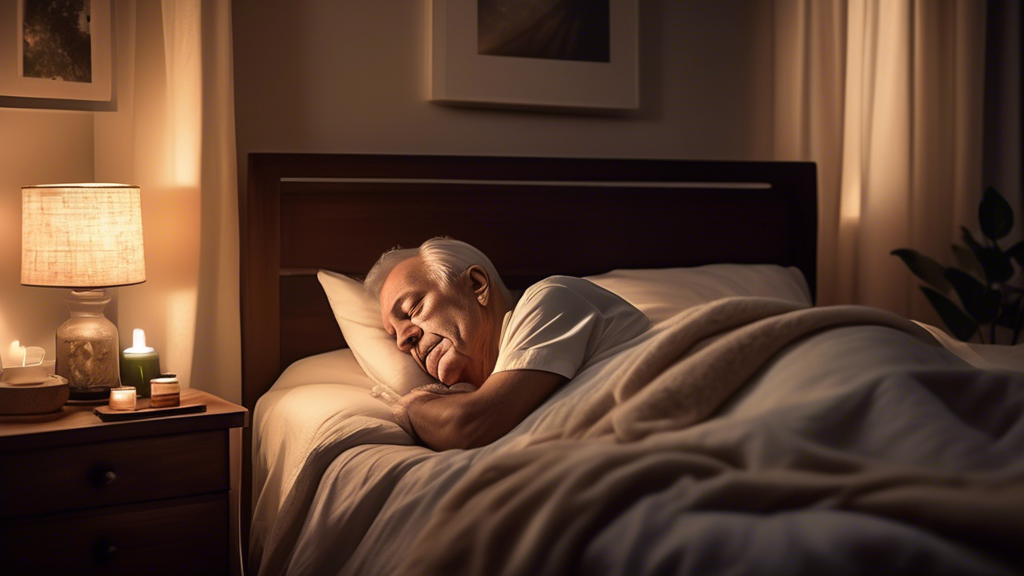Improving Sleep Quality: Tips for Men in Their Golden Years
As men enter their golden years, achieving and maintaining quality sleep becomes increasingly vital for overall health and well-being. Understanding the importance of sleep in this stage of life is crucial, as it offers a multitude of health benefits including enhanced cognitive function, improved mood, and boosted immune system performance. Unfortunately, older men often face common sleep challenges such as insomnia, sleep apnea, and frequent nocturnal awakenings, which can significantly impact their quality of life. Poor sleep can lead to various adverse effects, including heightened risk of chronic illnesses, decreased daytime functioning, and diminished emotional resilience.
To address these issues and promote better sleep, older men can adopt several effective strategies. Establishing a consistent sleep routine and creating a sleep-friendly environment can significantly enhance sleep quality. Additionally, making specific nutritional and lifestyle changes can further support restorative sleep. For those grappling with severe sleep disturbances, seeking professional help to address underlying sleep disorders is essential.
Incorporating natural remedies and regular exercise into daily routines can also aid in achieving better sleep. Safe and effective natural supplements may offer relief from sleep difficulties, while regular physical activity plays a crucial role in promoting restful nights. Gentle exercises and relaxation techniques practiced before bed can help in winding down and preparing the body for sleep. By embracing these tips and practices, men in their golden years can improve their sleep quality and, consequently, their overall health and well-being.
Understanding the Importance of Sleep for Men in Their Golden Years
The Health Benefits of Quality Sleep
Quality sleep is crucial for everyone, but for men in their golden years, it becomes even more essential. During sleep, the body undergoes a variety of restorative processes which are vital for maintaining health. Adequate sleep helps bolster the immune system, ensuring that the body can ward off infections and illnesses. Moreover, quality sleep plays a key role in cognitive function, which includes memory, concentration, and problem-solving abilities. For older men, sustaining good cognitive health is central to preserving independence and quality of life.
Another significant benefit of quality sleep is its impact on physical health, particularly heart health. Studies show that during sleep, the body works to reduce blood pressure, which can lower the risk of heart disease and strokes. Additionally, quality sleep supports metabolic functions, helping to manage weight and prevent conditions such as diabetes. Hormone regulation, including the balance of testosterone and growth hormones, is also largely influenced by sleep patterns. These hormones are critical for energy levels, muscle repair, and overall vitality.
Common Sleep Challenges for Older Men
Despite the clear benefits, men in their golden years often face unique challenges when it comes to sleeping well. One common issue is insomnia, characterized by difficulty falling or staying asleep. This can be due to various factors such as stress, anxiety, or medical conditions like arthritis which cause discomfort. Sleep apnea is another frequent problem; it involves interrupted breathing during sleep and can lead to daytime fatigue and other serious health issues if left untreated.
Additionally, older men may experience a shift in their sleep patterns known as advanced sleep phase syndrome (ASPS). This condition causes individuals to feel sleepy earlier in the evening and to wake up very early in the morning, disrupting the normal sleep cycle. Other factors such as frequent need to urinate at night (nocturia), restless leg syndrome, and the effects of certain medications can also contribute to disrupted sleep. Recognizing and addressing these challenges is the first step toward improving sleep quality.
The Impact of Poor Sleep on Overall Well-being
Poor sleep can have far-reaching effects on the overall well-being of older men. One of the most noticeable impacts is on mood and mental health. Chronic sleep deprivation is associated with increased risk of depression, anxiety, and other mood disorders, which can significantly diminish quality of life. It also affects energy levels and motivation, making it harder to engage in daily activities and hobbies.
Physically, poor sleep can exacerbate existing health conditions and speed up the aging process. Lack of adequate rest impairs the body’s ability to repair and regenerate cells, leading to quicker deterioration of health. This can manifest as weakened immune function, increased inflammation, and slower recovery from illness or injury. Furthermore, impaired cognitive function due to poor sleep can increase the risk of accidents and falls, a serious concern for older adults.
Long-term sleep deprivation is also linked to increased risk of serious health problems such as heart disease, diabetes, and obesity. These conditions can complicate existing medical issues, creating a vicious cycle of poor health outcomes. Thus, prioritizing and maintaining good sleep hygiene is paramount for enhancing both the physical and mental well-being of men in their golden years.

Effective Tips for Enhancing Sleep Quality
Establishing a Consistent Sleep Routine
One of the most crucial steps to improving sleep quality is establishing a consistent sleep routine. Going to bed and waking up at the same time every day helps regulate your body’s internal clock, known as the circadian rhythm. Consistency reinforces the sleep-wake cycle, making it easier to fall asleep at night and wake up feeling refreshed in the morning.
Start by determining an appropriate bedtime that allows for 7-9 hours of sleep, which is the recommended amount for most adults. Stick to this schedule even on weekends, as varying your sleep times can disrupt your sleep pattern. Over time, your body will adapt to this routine, leading to better sleep quality.
Creating a Sleep-Friendly Environment
Your sleep environment significantly impacts your ability to fall and stay asleep. Creating a sleep-friendly bedroom involves several factors:
- Comfortable Bedding: Invest in a good quality mattress and pillows that provide adequate support and comfort.
- Optimal Room Temperature: Keep your bedroom cool, ideally between 60-67 degrees Fahrenheit.
- Darkness: Use blackout curtains or an eye mask to block out light, which can interfere with your sleep.
- Quietness: Reduce noise with earplugs, a white noise machine, or soft, calming background sounds.
- Clutter-free Space: A tidy room can promote relaxation and help your mind unwind.
Making these adjustments creates an environment conducive to restful sleep, helping you fall asleep faster and stay asleep longer.
Nutritional and Lifestyle Changes to Promote Better Sleep
Your diet and daily habits play a significant role in your sleep quality. Here are several changes that can have a positive impact:
- A Balanced Diet: Consuming a diet rich in fruits, vegetables, lean proteins, and whole grains supports overall health and good sleep. Avoid heavy, spicy, or acidic meals close to bedtime as they can cause discomfort and indigestion.
- Avoid Stimulants: Limit the intake of caffeine and nicotine, especially in the afternoon and evening. These substances can interfere with your ability to fall asleep.
- Moderate Alcohol Consumption: While alcohol can initially make you feel drowsy, it can disrupt your sleep cycle later in the night.
- Regular Physical Activity: Engage in regular exercise but avoid vigorous activity close to bedtime. Physical activity can help you fall asleep faster and enjoy deeper sleep.
- Mindful Eating Before Bed: If you need a bedtime snack, opt for light and sleep-inducing foods such as a small portion of yogurt, a banana, or a handful of nuts.
Incorporating these nutritional and lifestyle changes can promote better sleep quality, enhance your overall health, and make you feel more energized throughout the day.
Addressing Sleep Disorders with Professional Help
Sleep disorders are more common as you age, but they are not a normal part of aging and can significantly impact your health and quality of life. Some common sleep disorders include:
- Insomnia: Difficulty falling or staying asleep.
- Sleep Apnea: A serious condition where breathing repeatedly stops and starts during sleep.
- Restless Legs Syndrome (RLS): An uncomfortable sensation in the legs that creates an urge to move them.
- Periodic Limb Movement Disorder (PLMD): Involuntary movements of the limbs during sleep.
If you experience symptoms such as excessive daytime sleepiness, loud snoring, or frequent awakenings, it’s essential to consult a healthcare professional. They can diagnose any underlying sleep disorders and recommend appropriate treatments.
Treatments may include lifestyle changes, medications, or therapeutic interventions. Cognitive-behavioral therapy for insomnia (CBT-I) is an effective treatment for chronic insomnia. For sleep apnea, continuous positive airway pressure (CPAP) therapy or other devices may be recommended.
Addressing sleep disorders with professional help ensures that you receive the correct diagnosis and treatment, leading to improved sleep quality and overall well-being.

3. Incorporating Natural Remedies and Exercise
Safe Natural Supplements for Improved Sleep
For those aiming to improve sleep quality in their later years, natural supplements can be a beneficial option. Melatonin, a hormone that regulates sleep-wake cycles, is a popular choice. Studies suggest that melatonin supplements can help older adults fall asleep more easily and enhance overall sleep duration.
Another natural supplement, valerian root, has been used for centuries to promote relaxation and improve sleep. Research indicates that it may reduce the time it takes to fall asleep and produce better sleep quality. Additionally, magnesium, an essential mineral, can help calm the nervous system and prepare the body for rest, making it a valuable supplement for nighttime use.
It is important, however, to consult with a healthcare provider before starting any new supplement regimen, especially for men in their golden years. They can provide personalized recommendations and ensure there are no interactions with existing medications.
The Role of Regular Physical Activity in Sleep Quality
Engaging in regular physical activity is a cornerstone of better sleep for older men. Exercise helps regulate the body’s internal clock (circadian rhythms), making it easier to fall asleep and wake up at consistent times. Additionally, physical activity reduces stress and anxiety, which are common barriers to a good night’s rest.
Aim for moderate-intensity activities such as brisk walking, swimming, or cycling. These activities can improve cardiovascular health and overall well-being, further contributing to better sleep patterns. Ideally, avoid vigorous exercise close to bedtime, as it may have a stimulating effect, making it harder to fall asleep.
Incorporating physical activity into your daily routine can also help mitigate sleep apnea symptoms. Sleep apnea, a condition characterized by interrupted breathing during sleep, is more prevalent in older men. Regular exercise can aid in weight management and improve respiratory function, reducing the severity of sleep apnea episodes.
Gentle Exercises and Relaxation Techniques Before Bed
While vigorous exercise should be avoided close to bedtime, gentle exercises and relaxation techniques can prepare the body for a restful night. Stretching exercises, such as yoga or tai chi, can relax the muscles and joints, easing tension accumulated throughout the day. Focusing on deep, controlled breathing during these exercises can also soothe the mind and promote a sense of calm.
Progressive muscle relaxation (PMR) is a technique where you tense and then slowly release each muscle group in your body. This method can help release physical tension and reduce stress, making it easier to drift off to sleep. Another valuable relaxation method is mindfulness meditation. Spending just a few minutes meditating each night can significantly reduce anxiety and improve sleep quality over time.
Encouraging a bedtime routine that includes these gentle exercises and relaxation techniques can help signal to the body that it is time to wind down. Consistency is key, as a regular pre-sleep routine can reinforce healthy sleep patterns and improve sleep quality in men during their golden years.
In conclusion, understanding the significance of sleep for men in their golden years cannot be overstated. Quality sleep is vital as it plays a crucial role in maintaining health, mitigating common age-related challenges, and ensuring overall well-being. Men in this age group often face unique sleep issues, such as changes in sleep architecture and increased prevalence of sleep disorders, which can negatively impact their health if not addressed properly.
To combat these issues, several effective strategies can enhance sleep quality. Establishing a consistent sleep routine helps regulate the body’s internal clock, while creating a sleep-friendly environment can eliminate potential disturbances and promote restful slumber. Additionally, making specific nutritional and lifestyle changes, such as reducing caffeine and screen time before bed, can lead to substantial improvements in sleep. It’s also essential for men to seek professional help if they experience persistent sleep disorders, as these conditions require specialized care.
Furthermore, incorporating natural remedies and regular exercise into daily routines can significantly benefit sleep quality. Safe natural supplements, like melatonin, can provide gentle assistance without the adverse effects often associated with prescription medications. Regular physical activity is equally crucial, as it helps to regulate the sleep-wake cycle and improve overall health. Practices such as gentle exercises and relaxation techniques, including stretching or meditation before bed, can also prepare the body for a more restful night’s sleep.
By integrating these approaches, men in their golden years can enjoy better sleep, which in turn supports their overall health and quality of life. Prioritizing sleep through a combination of routine, environment, lifestyle modifications, professional guidance, natural supplements, and exercise can lead to more rejuvenating and satisfactory rest.

